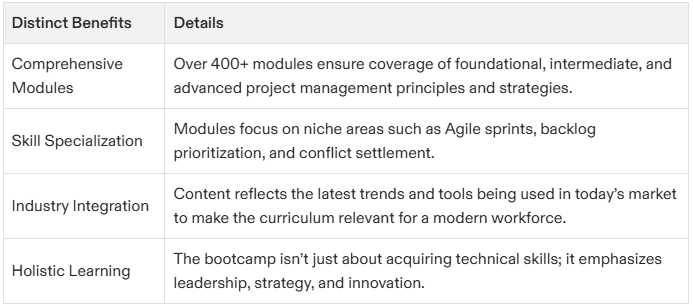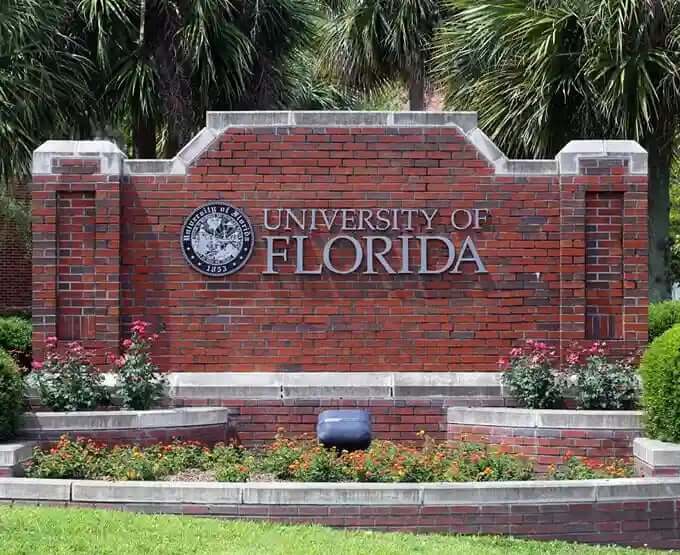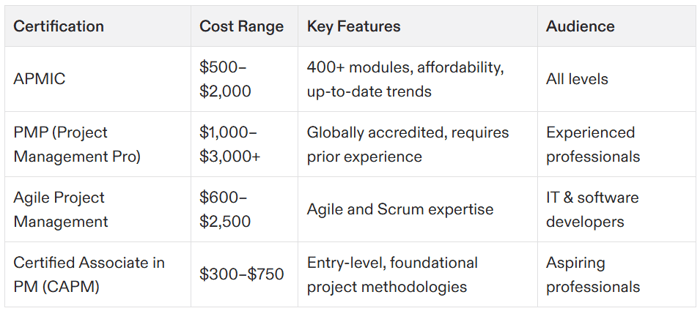Table of Contents
If you believe that HR is only about hiring and firing then you are mistaken! Handling human resources today is like being the captain of a spaceship i.e. managing recruitment, compliance, employee engagement, training and business strategies while at the same time avoiding meteors (any other unexpected HR crises). And here’s the thing: The best HR professionals have a secret weapon: It is a Project Management Certification.
Project management is not only for tech geeks and construction crews. In fact, those HR professionals who have learned system thinking and have adopted project management methodologies are more efficient, strategic, and valuable to their organizations. Whether you are implementing a new onboarding process, introducing a company-wide policy change or dealing with a major restructuring, a Project Management Certification can take your HR career to the next level.
In this ultimate guide, we’ll break down the best project management certifications for HR professionals, why they matter, how to choose the right one, and how they can supercharge your career in 2025.
For a deeper dive into different certification types, check out this Master Guide to Project Management Certification Types
Why HR Professionals Need a Project Management Certification
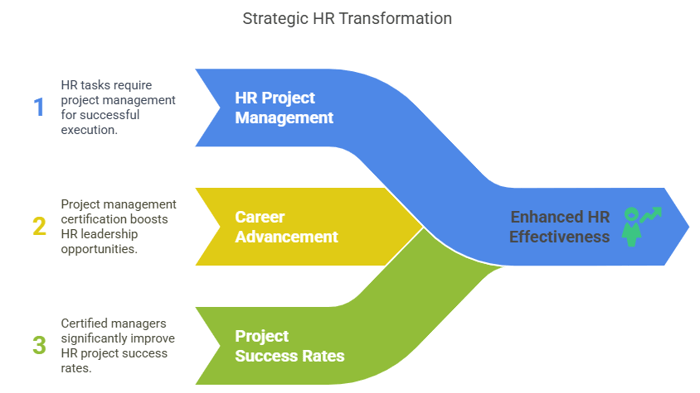
1. HR is Full of Projects (Even if You Don’t Call Them That!)
Human Resources is no longer just about administrative tasks—it’s about strategy, execution, and business impact. Every HR initiative is, in essence, a project requiring meticulous planning, resource allocation, and execution. Here’s why HR is essentially project management in disguise:
Implementing HR Software Systems – Whether it’s a new applicant tracking system (ATS) or a cloud-based HRIS, implementing software involves budgeting, timelines, user training, and system integration—classic project management components.
Designing Company Training Programs – Creating an employee development program requires needs assessment, stakeholder engagement, curriculum development, and tracking ROI—just like any formal project.
Managing Employee Engagement Initiatives – Employee satisfaction and workplace culture aren’t just buzzwords; they require structured surveys, action plans, and follow-ups to drive results.
Restructuring Compensation and Benefits – Modifying salary structures or benefit plans needs careful planning, market benchmarking, and seamless communication to avoid disruption.
Developing Succession Planning Frameworks – Identifying key talent, creating leadership pipelines, and ensuring smooth transitions require goal-setting, strategy, and monitoring—fundamental project management practices.
Without structured project management skills, HR professionals can face missed deadlines, budget overruns, and disengaged stakeholders. By applying PM principles, you ensure efficiency, accuracy, and strategic alignment in every HR initiative.
2. Enhance Your Credibility and Career Growth
The modern HR professional isn’t just a policy enforcer; they are business enablers. Having a Project Management Certification positions you as a capable leader who can manage multiple initiatives efficiently, handle complex workflows, and drive real impact.
How a Project Management Certification Elevates Your Career:
More Leadership Opportunities – Organizations favor HR leaders who can align HR projects with business goals, manage cross-functional teams, and deliver results.
Higher Salaries – HR professionals with project management expertise can earn 20-25% more than their non-certified counterparts.
Global Recognition – PM certifications, such as PMP or PRINCE2, are internationally respected and open doors to global HR roles.
Better Decision-Making – You’ll gain skills in risk management, budget planning, and stakeholder coordination, making you a more valuable asset to any company.
HR teams that embrace project management methodologies become more strategic, data-driven, and proactive rather than reactive. This means fewer last-minute scrambles, more predictable results, and higher job satisfaction.
3. Improve HR Project Success Rates
According to PMI’s 2024 Pulse of the Profession Report, organizations with certified project managers successfully complete 89% of their projects, compared to 43% without certified project managers. That’s a staggering difference that directly impacts business performance.
For HR professionals, this means:
Fewer failed initiatives – Structured project management reduces errors and ensures HR programs meet their intended goals.
Stronger stakeholder engagement – Managing HR projects with a PM framework helps secure leadership buy-in and cross-functional support.
Better resource allocation – HR budgets are often tight, and applying PM principles helps optimize time, people, and financial resources.
A poorly managed HR project—whether it’s a failed diversity initiative, a botched compensation rollout, or an ineffective performance management system—can have disastrous effects on employee morale and company reputation. By integrating project management skills, HR professionals increase efficiency, mitigate risks, and drive long-term business success.
Best Project Management Certifications for HR Professionals
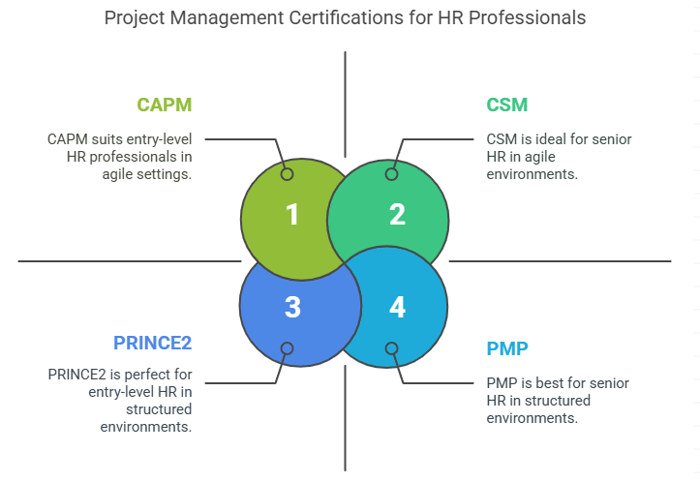
1. PMP (Project Management Professional) – The Gold Standard
Offered by: Project Management Institute (PMI)
Best For: Senior HR leaders managing large-scale projects
Why Choose It? The PMP is globally recognized and demonstrates expertise in managing complex projects, teams, and budgets. It's perfect for HR professionals leading change management or large organizational initiatives.
2. CAPM (Certified Associate in Project Management) – Ideal for Beginners
Offered by: PMI
Best For: Entry to mid-level HR professionals
Why Choose It? If you’re new to project management but want foundational knowledge, the CAPM is a great start. It teaches fundamental project management principles.
3. PRINCE2 (Projects IN Controlled Environments) – Structured and Popular in Europe
Offered by: AXELOS
Best For: HR professionals working in structured corporate environments
Why Choose It? PRINCE2 provides a well-defined framework for project execution, making it valuable for HR professionals managing structured projects like HRIS implementations.
4. CSM (Certified Scrum Master) – Best for Agile HR
Offered by: Scrum Alliance
Best For: HR teams implementing agile methodologies
Why Choose It? If your company is adopting agile HR practices, a CSM certification helps you lead iterative projects effectively.
5. PHR/SPHR with a PM Focus
Offered by: HRCI
Best For: HR professionals looking for a certification that blends HR expertise with project management.
Why Choose It? These HR-specific certifications now incorporate project management principles, making them a great choice.
For HR professionals looking for university-based certifications, explore the Project Management Certification University: The Ultimate Guide.
How to Choose the Right Certification for You
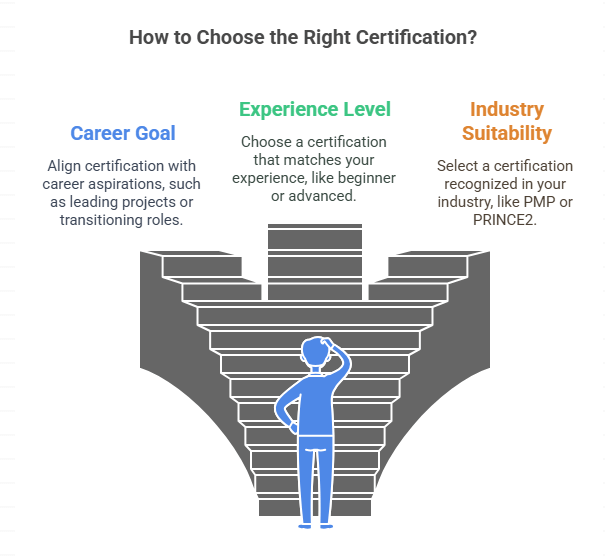
Ask yourself these questions:
What’s my career goal? Do you want to lead HR projects or transition into a full-time project management role?
What’s my experience level? If you’re new to project management, CAPM or PRINCE2 might be a better start.
What industries do I work in? PMP is globally recognized, while PRINCE2 is better suited for structured corporate settings.
Do I work in an agile company? If yes, consider getting a CSM certification.
10 Lesser-Known Facts About Project Management in HR
70% of HR professionals who integrate project management skills into their role see an increase in salary within 2 years.
HR project failures cost businesses an estimated $100 billion annually worldwide.
(Source: Wikipedia - Project Management)The concept of Agile HR is growing—combining HR principles with agile project management for faster, people-centric results.
(Source: Wikipedia - Agile HR)AI-powered project management tools now help HR professionals manage workflows more effectively.
(Source: Wikipedia - Artificial Intelligence)Microsoft and Google now require project management knowledge for HR leadership roles.
(Source: Wikipedia - Human Resources)Hybrid project management (mixing Agile and Waterfall methods) is becoming the norm in HR.
(Source: Wikipedia - Hybrid Project Management)Emotional intelligence (EQ) is now a key competency in project management certification exams.
(Source: Wikipedia - Emotional Intelligence)HR Project Managers are among the top 10 emerging job roles in 2025.
Scrum methodologies are now widely applied in HR, particularly for recruitment and performance management projects.
(Source: Wikipedia - Scrum (Software Development))HR-led digital transformation projects have the highest failure rate due to a lack of project management skills.
(Source: U.S. Department of Labor - Digital Transformation)
Conclusion: Supercharge Your HR Career with PMP Certification
If you want to future-proof your HR career, getting a Project Management Certification is one of the smartest moves you can make in 2025. It boosts your skills, enhances job prospects, and increases your ability to manage complex HR initiatives effectively.
Ready to level up? Check out the best PMP Certification Prep Course here: PMP Certification Prep Course.
FAQs
What is the best project management certification for HR professionals?
PMP is the most recognized, but PRINCE2, CAPM, and CSM are also excellent depending on your role and experience.
How can HR professionals use project management skills?
HR professionals use project management for hiring processes, training programs, HR software implementations, and change management initiatives.
Is PMP worth it for HR?
Yes! PMP-certified HR professionals earn up to 20% more and have better job opportunities.
Can I get a project management certification without experience?
Yes, the CAPM is a great entry-level certification that requires no prior experience.
How long does it take to get PMP certified?
On average, it takes 3-6 months of study to prepare for the PMP exam.
Do HR professionals need Agile project management?
Yes, Agile is increasingly used in HR for iterative projects like employee engagement and learning development.



